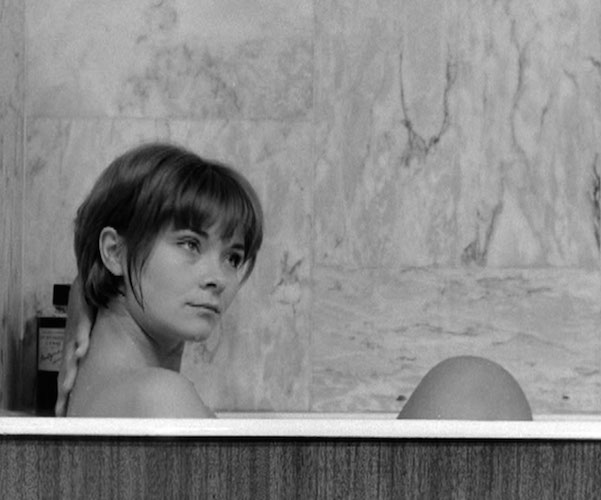Film Review: “A Married Woman” — Beautifully Empty-headed
I appreciate the effort to bring back this rarely seen early Godard. But there are reasons this movie hasn’t been previously revived, starting with a protagonist whom we don’t much care about, and neither does the filmmaker.
A Married Woman, directed by Jean-Luc Godard. Screening at the Kendall Square Cinema.

A scene from Godard’s 1964 “A Married Woman,” screening at the Kendall Square Cinema.
By Gerald Peary
Is there such a thing as a sexist feminist? That’s my label for filmmaker Jean-Luc Godard in the 1960s. He made a series of films showing women shaped and oppressed by marketing and advertising, but he blamed them for being complicit in their oppression. Think of Masculine/Feminine (1965), where the guys are obsessed with politics and cinema, the women with banal pop music and a silly life of fashion. Godard’s annoyance with the female race is the very stuff of A Married Woman (1964), which has been restored in a pristine black-and-white print. I appreciate the effort to bring back this rarely seen early Godard. But there are reasons this movie hasn’t been previously revived, starting with a protagonist whom we don’t much care about, and neither does the filmmaker.
This film offers 24 hours in the vapid, vaguely dissatisfied life of Charlotte (Macha Méril), who bounces between the bed of her actor lover, Robert (Bernard Noël), and that of her pilot husband, Pierre (Philippe Leroy). She loves both of them, sort of, and both want to have a child with her. Deep in the movie, we find that Charlotte is pregnant, but she doesn’t know who the father is. Does she want a child? Does she want to leave her husband? Does she want to run away with her lover? Charlotte could be said to be having a major “identity crisis.” The trouble is: she doesn’t really have an identity to begin with.
We all know the type, the empty-headed fashion plate, with swan skin, incurious eyes, cute bangs, a luxuriant haircut. What she knows is from fashion magazines, period. Her lover has a picture of Moliere on the wall, she is ignorant about France’s greatest playwright. She asks her husband to identify a movie she saw, she has no idea (a heresy for film-crazy Godard) of its name. Most damning, she is madly ignorant of what happened in the War. She somehow gets the Holocaust mixed up with… thalidomide babies! When Charlotte and her lover have a clandestine meeting in a cinema, the film comes on, and it’s Alain Resnais’ great Holocaust documentary, Night and Fog. Godard holds on Charlotte’s dim face, looking up at the screen without the slightest comprehension.
Why did Godard bother to make a movie about someone so uninteresting and, model-like good looks aside, so unalluring? Who follows religiously the instructions in Paris Elle to determine if she has the right-size bust? Who fails in her life objective: “The most important thing for me is to understand what’s happening to me.”
If there’s a saving grace to A Married Woman, it’s the formally arresting way that Godard tells his slight story, slicing up his many scenes in bed with intense closeups of arms, skin, backs, often paralleling the lovemaking of Charlotte and her lover and Charlotte and her husband, the biggest difference being one wedding ring versus two. If that’s not enough excitement, the assignations are accompanied by the most splendorous music imaginable, majestic selections from five Beethoven quartets.
Gerald Peary is a professor at Suffolk University, Boston, curator of the Boston University Cinematheque, and the general editor of the “Conversations with Filmmakers” series from the University Press of Mississippi. A critic for the late Boston Phoenix, he is the author of nine books on cinema, writer-director of the documentaries For the Love of Movies: the Story of American Film Criticism and Archie’s Betty, and a featured actor in the 2013 independent narrative Computer Chess.
